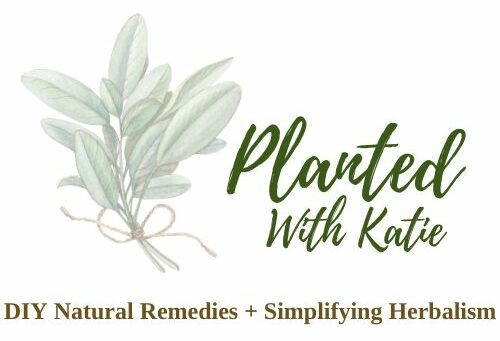Oil of Oregano Vs Oregano Oil: What's The Difference?
When it comes to natural remedies, oil of oregano vs oregano oil is a common topic of confusion. While both products come from the Origanum vulgare plant, they serve different purposes and have distinct uses.
Understanding the difference is key to using them safely and effectively, whether you're looking for support with bacterial infections, gut health, or skin care. Let’s dive into how these two oils differ and which one might be best for your needs.
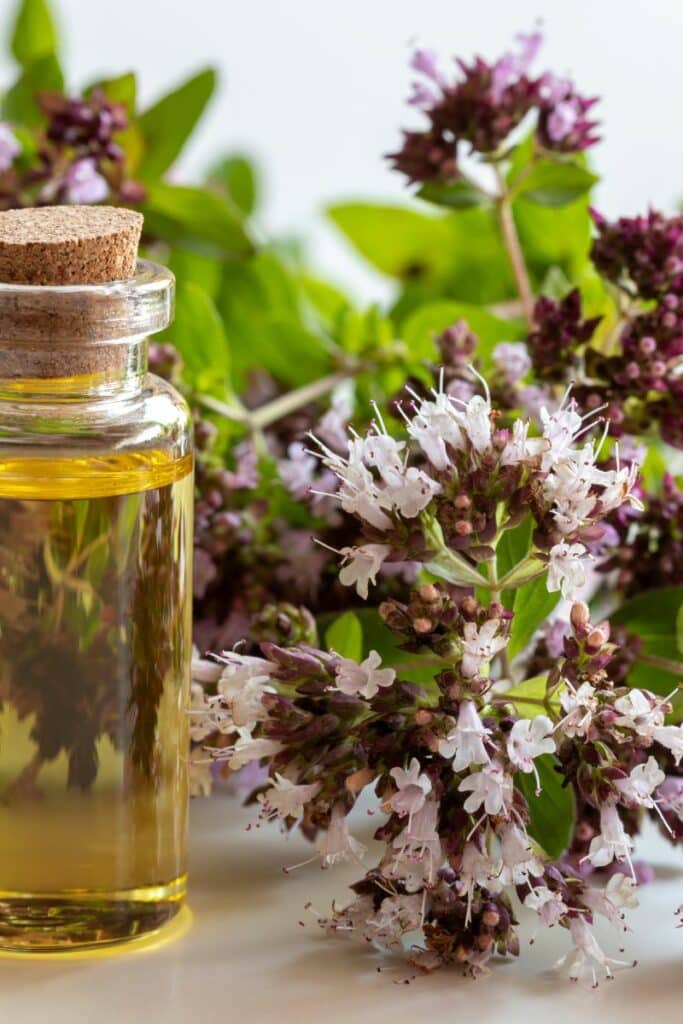
Disclaimer: This is not medical advice. Information and statements shown here are for educational and informational purposes only and are not to replace the advice of your healthcare professional.
This post may include affiliate links. Please refer to our disclaimer for full disclosure.
Many people get confused between oregano essential oil and oregano-infused oil because they sound similar, but they’re actually very different!
Oregano essential oil is a concentrated steam-distilled extract made from the leaves of the oregano plant, specifically from Origanum vulgare. It has strong antibacterial, antifungal, and anti-inflammatory properties, but it can be very powerful and might even cause an allergic reaction or skin irritation if not used carefully. This oil is usually only used in very small amounts, often under the guidance of a healthcare provider, especially for internal use.
On the other hand, oregano-infused oil is a gentler product where dried oregano vulgare is soaked in a carrier oil like olive or fractionated coconut oil to extract its health benefits. This oil is typically safer for external use, internal use, or in cooking and doesn't have as strong effects as the essential oil.
The goal here is to help you understand the differences between these two products so you can make an informed decision about which is best for you. If you're considering internal use, it's important to know which oil to use and how to do so safely!
Understanding Oregano Essential Oil
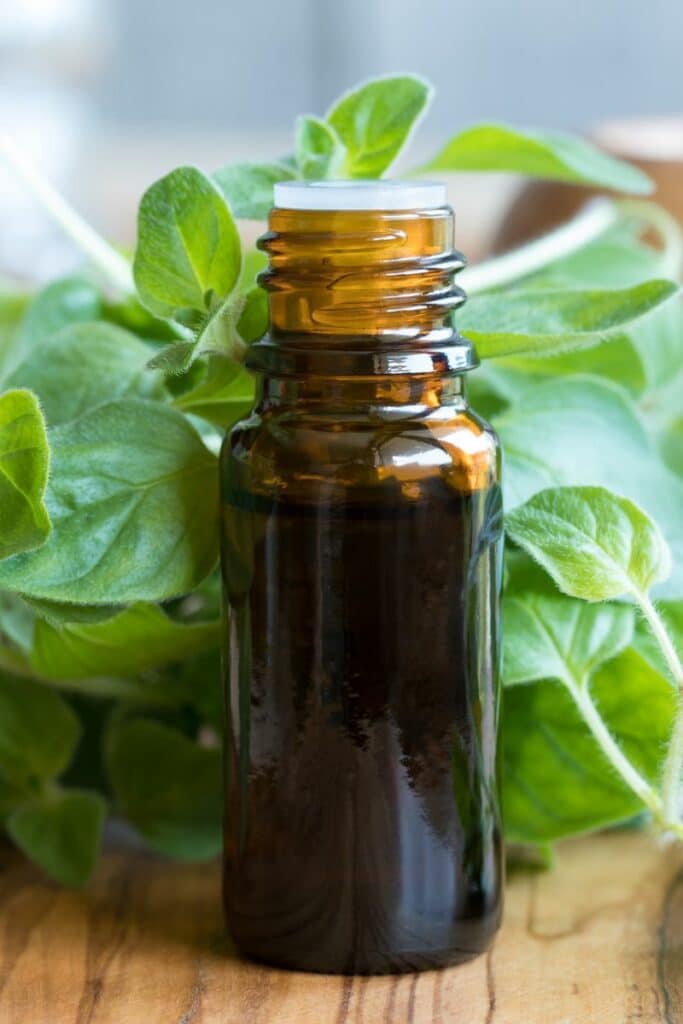
Definition
Oregano essential oil is a super-concentrated liquid made from the leaves of the oregano plant (Origanum vulgare). It's extracted through a process called steam distillation, which captures the most powerful-smelling parts of the plant.
Composition
This oil contains two key compounds: carvacrol and thymol. These are volatile compounds that give the oil its strong antimicrobial properties, which means they can fight off bacterial infections, fungal infections, and other harmful germs.
Main Compounds in Oregano Essential Oil
- Carvacrol (50-85%):
- The primary active component, known for its antimicrobial, anti-inflammatory, and antioxidant properties.
- Thymol (2-15%):
- Another powerful antiseptic and antioxidant compound, often present in a smaller percentage compared to carvacrol.
- p-Cymene (5-10%):
- A precursor to carvacrol and thymol, with anti-inflammatory properties.
- γ-Terpinene (5-15%):
- A monoterpene that contributes to the oil’s antioxidant effects and acts as a precursor to carvacrol and thymol.
- Linalool (1-3%):
- Known for its antimicrobial and relaxing effects, often found in smaller concentrations.
- Terpinene-4-ol (trace amounts):
- A compound with antifungal and antibacterial activity.
- β-Caryophyllene (2-8%):
- A sesquiterpene with anti-inflammatory and pain-relieving properties.
- α-Pinene (trace to 1%):
- Known for its bronchodilator and anti-inflammatory properties.
- Myrcene (trace amounts):
- Known for its analgesic and anti-inflammatory benefits.
Minor Components
- Caryophyllene oxide
- Borneol
- Camphor
- Humulene
- Spathulenol
Uses: Oregano essential oil is mostly used in aromatherapy to help with things like respiratory health and stress relief, or it can be applied to the skin (but always mixed with a carrier oil like coconut oil to avoid skin irritation). It’s also found in some massage oils to relieve pain or help with wound healing.
Caution: Even though oregano essential oil has potential health benefits, it’s way too strong to take internally. If you swallow it, it can irritate your digestive system and even cause toxic effects over time. This is why the FDA and most aromatherapy organizations warn against using essential oils like this by mouth.
It's best to use oregano essential oil externally or as part of aromatherapy, and always be careful to dilute it properly to avoid any allergic reactions or side effects.
Risks of Using Essential Oils Internally
Potential Toxicity
Taking essential oils like those made from Origanum vulgare internally, even in small amounts, can be dangerous. Essential oils are extremely concentrated, and their powerful compounds can harm the body if not used correctly.
Over time, they can lead to serious issues like liver toxicity, digestive irritation, or severe allergic reactions. For example, ingesting too much essential oil of oregano may upset your stomach or even damage your organs.
Lack of Regulation
The FDA doesn’t regulate essential oils like it does food or medicine, meaning there’s little oversight on the quality, purity, or safety of the oils sold on the market. There are no clear guidelines for safe dosages, especially for internal use, which is concerning because essential oils are highly concentrated. This lack of regulation means companies can make various claims about their products, and you may not always be getting pure or high-quality oils.
Without standardized testing, you can’t always be sure if the essential oil has been diluted, adulterated, or contains contaminants. Inconsistent quality can lead to unpredictable effects, and without guidelines, it's easy to accidentally take too much, leading to toxicity or harmful side effects such as skin irritation, digestive issues, or even more severe reactions.
This is why it’s crucial to be cautious, especially when using essential oils internally, and to consult with an expert or practitioner when in doubt.
Case Studies
There have been case studies and human research showing that misuse of essential oils, such as swallowing them without proper guidance, has led to serious health problems. In some cases, people experienced toxic effects after taking essential oils like oregano internally, leading to trips to the hospital with issues like severe stomach pain or even damage to the liver. Always talk to a healthcare provider before considering internal use of essential oils.
Understanding Oregano-Infused Oil
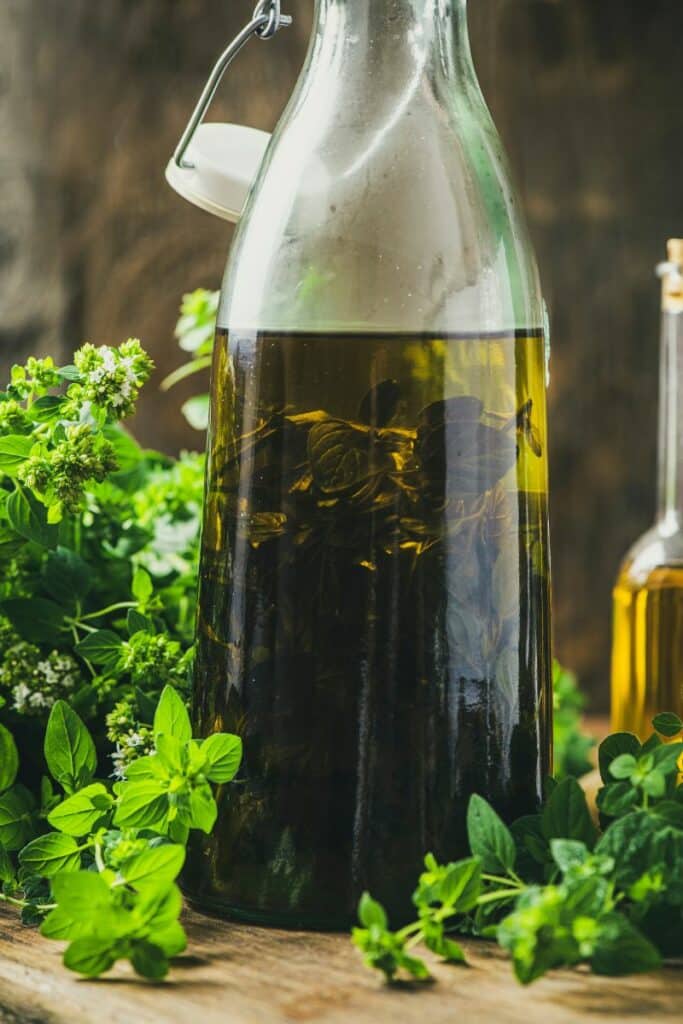
Definition
Oregano-infused oil is made by soaking dried oregano leaves (usually from Origanum vulgare) in a food-grade carrier oil, like organic olive oil. This process slowly pulls out the good stuff from the oregano without making it too strong.
Composition
Infused oil contains a variety of beneficial compounds in gentle, natural amounts. These include:
Here are the primary compounds you typically get in oregano-infused oil:
1. Phenolic Compounds
These are some of the most important bioactive compounds extracted during infusion.
- Carvacrol: Still present, though in much lower concentrations than in essential oil. It retains its antimicrobial and anti-inflammatory effects.
- Thymol: Another phenolic compound, also present in small amounts, known for its antioxidant and antiseptic properties.
2. Flavonoids
Infusion tends to extract more flavonoids (which may not be abundant in essential oil).
- Apigenin: A flavonoid with anti-inflammatory and antioxidant properties.
- Quercetin: Known for its antioxidant and antiviral effects, quercetin helps with immune support and inflammation.
- Luteolin: Another flavonoid that offers anti-inflammatory and antioxidant benefits.
3. Rosmarinic Acid
- Found in oregano and other herbs in the Lamiaceae family, rosmarinic acid is a potent antioxidant with anti-inflammatory and antiviral properties. It's commonly extracted in the infusion process, making infused oil rich in this compound.
4. Tannins
- Oregano is also high in tannins, which are astringent compounds with mild antibacterial and antioxidant properties.
5. Terpenes
Though the concentrations of terpenes like carvacrol and thymol are much lower in an infusion compared to essential oil, small amounts of other terpenes can also be present, such as:
- p-Cymene
- Gamma-Terpinene
- β-Caryophyllene
6. Vitamins and Minerals
Oregano is rich in certain vitamins and minerals that can also be slightly transferred into the infused oil:
- Vitamin E: Oregano has small amounts of this antioxidant, which can contribute to skin health when infused in oil.
- Magnesium, Calcium, and Iron: These are present in small amounts and can add some nutritional benefits to the infused oil.
7. Antioxidants
The infusion process helps extract a range of antioxidants, making oregano-infused oil beneficial for protecting the skin from oxidative stress and supporting overall immune health.
Uses
Oregano-infused oil is safe to eat in small amounts. You can use it in cooking, like drizzling over salads or mixing into sauces. It’s also taken as a supplement for immune support, digestive health, and its mild antimicrobial properties to help fight things like bacterial infections and fungal infections.
Key Differences Between Oregano Essential Oil and Oregano-Infused Oil
Concentration:
- Oregano Essential Oil: This oil is extremely concentrated, packed with powerful compounds like carvacrol and thymol, which give it strong antibacterial and antifungal properties. However, because it’s so strong, it’s generally not safe for internal use and can cause irritation or even toxic effects if ingested.
- Oregano-Infused Oil: This is much gentler. It’s made by soaking the leaves of the oregano plant (Origanum vulgare) in a carrier oil like coconut oil, which results in a milder product. The infused oil keeps a broader range of beneficial compounds, making it safer for internal use.
Method of Extraction:
- Oregano Essential Oil: Created through steam distillation, which isolates only the volatile oils like carvacrol and thymol. These oils are super potent and highly concentrated, which makes them useful in aromatherapy and for external use but too strong for ingesting.
- Oregano-Infused Oil: Made by infusing the whole herb into a food-grade oil. This method retains many of oregano’s natural properties, including its antioxidant and anti-inflammatory properties, making it more balanced and versatile for culinary and supplemental uses.
Safety:
- Essential Oils: Not safe to take internally because of how concentrated they are. They can cause digestive problems, skin irritation, or even worse if taken incorrectly. It’s always a good idea to consult a healthcare provider before using essential oil of oregano.
- Infused Oils: Safer for internal use, especially when used in small amounts as part of a balanced diet. You can even add it to foods for an extra health boost or use it as a mild supplement.
Application:
- Essential Oils: Best used for topical applications (but always diluted with a carrier oil) or for aromatherapy. It has been studied for its ability to fight off different types of bacteria and may help with wound healing and pain relief, but it’s too strong for daily internal use.
- Infused Oils: Great for both culinary and supplemental use. You can use it in recipes to support your gut health, boost your immune system, or even for antimicrobial benefits to fight off bacterial infections and fungal infections like E. coli or Staphylococcus aureus.
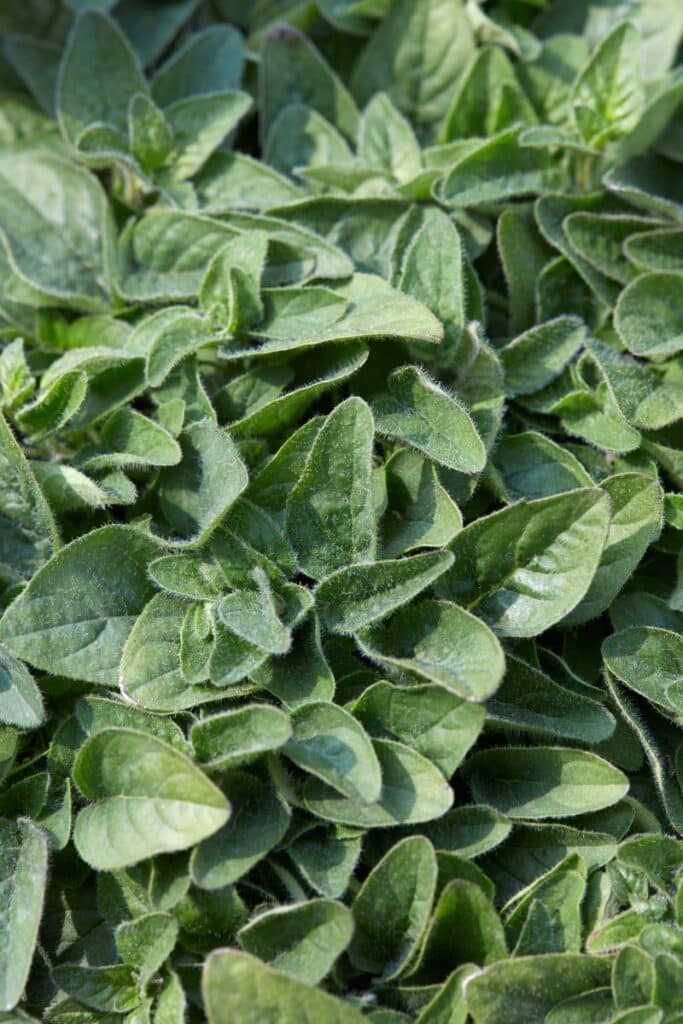
Oil of Oregano Vs Oregano Oil
What’s the difference between oregano-infused oil and oregano essential oil?
Oregano-infused oil is made by soaking dried herbs in a carrier oil, such as olive oil, which extracts a variety of beneficial compounds. Oregano essential oil, on the other hand, is a highly concentrated oil extracted from the leaves of the oregano plant through methods like steam distillation. The essential oil form is much stronger and should only be used for aromatherapy or diluted topical applications, not internal use.
Can I take oregano-infused oil in capsule form?
Yes, you can find oregano-infused oil in capsule form as an herbal supplement. This is a safer option for internal use compared to oregano essential oil because the infusion is gentler on your system and offers a more balanced range of benefits, such as supporting a stronger immune system and promoting gut health.
Does oregano oil help with bacterial infections like E. coli?
Oregano oil extract contains compounds like carvacrol and rosmarinic acid with antibacterial properties that may help fight bacterial growth, including strains like E. coli. However, limited research and vitro studies mean you should consult a healthcare provider before using it to treat a medical condition.
Are there any side effects to using oregano essential oil internally?
Yes, using essential oil of oregano internally can cause toxic effects, such as abdominal pain, digestive issues, and even liver toxicity. The high concentration of powerful compounds can overwhelm the body. Always stick to oregano-infused oil for internal use, or consult your doctor before trying any new drug administration.
What are the potential benefits of using oregano-infused oil?
Oregano-infused oil offers several health benefits, including promoting heart health and fighting oxidative stress due to its antioxidant properties. It also supports gut health, aids in wound healing, and helps with bacterial infections and fungal infections. It's a more balanced option compared to essential oils and can be safely used both internally and externally.
Is oregano part of the mint family?
Yes, oregano is a perennial herb that belongs to the Lamiaceae family, which also includes other popular herbs like mint and rosemary.
Can I use oregano-infused oil for skin care?
Yes, oregano-infused oil is safe for external use and can be applied to the skin to help with wound healing, minor skin irritations, or as part of a massage oil blend. Its anti-inflammatory properties and antibacterial properties make it effective for soothing the skin.
Are there any concerns with oregano oil and other health conditions?
Yes, people with certain health conditions, like heart disease or digestive problems, should consult a healthcare provider before using oregano oil, especially in concentrated forms. Although there are many potential health benefits of oregano oil, it’s important to use it carefully and understand any risks specific to your medical condition.
Benefits of Oregano-Infused Oil (Why It's a Better Choice for Internal Use)
Gentler on the Body: Oregano-infused oil offers a wider range of compounds from the leaves of the oregano plant (Origanum vulgare) without overwhelming your body with high doses of volatile oils. This makes it safer for internal use, especially when compared to more concentrated forms like essential oil of oregano.
Nutrient-Rich: Infused oil keeps many of the plant's natural nutrients, including vitamins, minerals, and powerful antioxidant properties. These compounds can protect the body from free radicals and promote overall health, especially for gut health and immune support.
Versatile: This oil can be used in many ways. You can add it to your food for a mild health boost or take it as an herbal supplement. It’s also great for external use on mild skin irritations or for soothing massages. Its antimicrobial and anti-inflammatory properties help with wound healing and can even provide relief for digestive problems.
Natural Medicine Cabinet Staple: Oregano-infused oil (or even an oregano tincture) is a must-have for your natural medicine cabinet. It’s a gentle and effective tool for daily immune support, digestive health, and mild protection against bacterial and fungal infections like E. coli or Staphylococcus aureus. Perfect for maintaining overall wellness with its many potential health benefits!
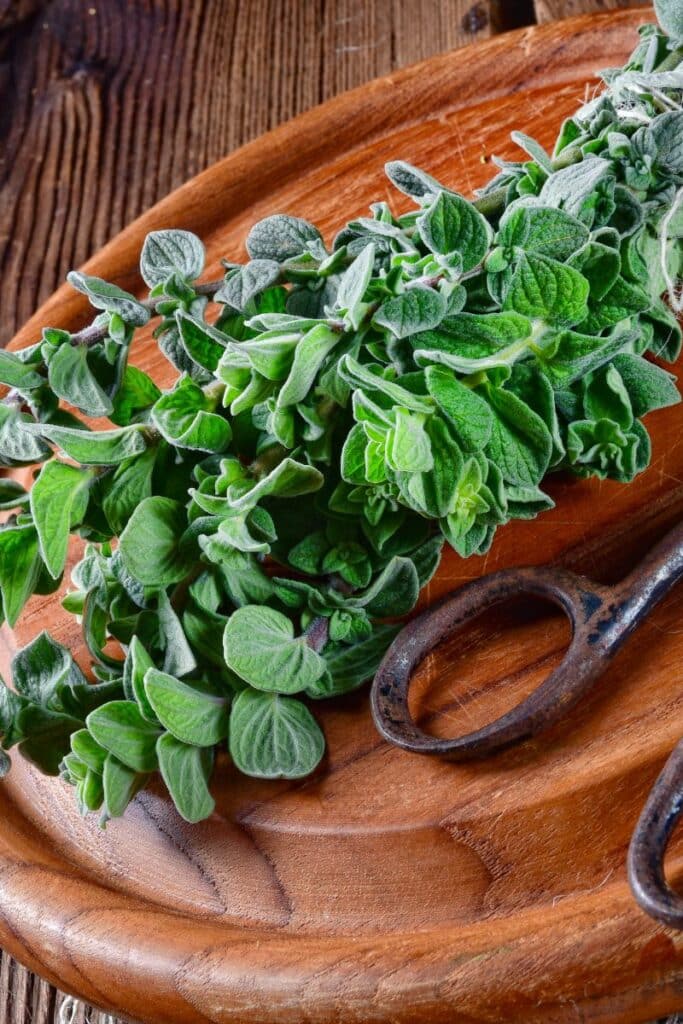
How to Use Oregano-Infused Oil Safely
Culinary Use
You can easily add oregano-infused oil to your meals. Drizzle it over salads, soups, or pasta for extra flavor and to enjoy its potential health benefits. This oil, made from the leaves of the oregano plant (Origanum vulgare), provides gentle antioxidant and anti-inflammatory properties that support your gut health and overall wellness.
Supplemental Use
For a daily health boost, especially during cold and flu season, take a small teaspoon of oregano-infused oil. It can help support your immune system with its mild antibacterial and antifungal properties. Always start with a small amount and check with a healthcare provider if you have any concerns.
Adult Dose
Capsules: 450 mg 2x/day with meals
Powder: 0.5 – 1 teaspoon with food
Tincture: Standard extract: 260 mg a day
Essential Oil: 90mg daily (ONLY 2 drops!)
Dosage information from Herbal Remedies: A Quick and Easy Guide to Disorders and their Herbal Treatments by Asa Hershoff and Andrea Rotelli
To finish this dosage chart, a recommended adult dose of oregano-infused oil is 0.5 teaspoon with food, twice a day if needed.
Topical Use
Oregano-infused oil can also be used on the skin. Apply it to minor skin irritations or as a massage oil to help relieve muscle tension. The anti-inflammatory and antimicrobial properties may aid in wound healing and soothe the skin without being too harsh, as it’s much gentler than essential oil of oregano.
How to Make Your Own Oregano-Infused Oil
Here’s an easy recipe to make your own oregano-infused oil at home using Origanum vulgare. This oil provides a gentle way to enjoy the health benefits of oregano for gut health, immune support, and skin care.
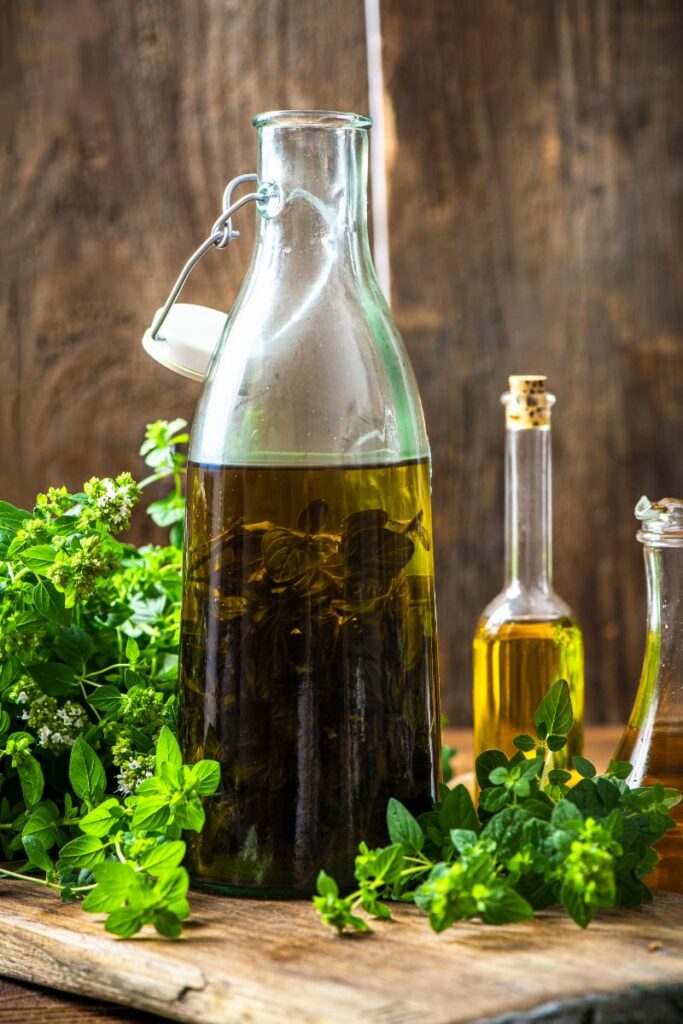
Ingredients
- 1 ounce of dried oregano (preferably organic)
- 8 ounces of organic olive oil (or another food-grade oil)
Step-by-Step Instructions (with Double Boiler Method)
1. Blend the ingredients:
- Combine 1 ounce of dried oregano with 8 ounces of olive oil in a blender.
- Blend for about 30 seconds to break down the oregano and mix it well with the oil.
2. Set up the double boiler:
- Fill a pot with a few inches of water and place a heat-safe bowl or smaller pot over it (make sure it doesn’t touch the water).
- Heat the water on low to create a gentle heat.
3. Heat and infuse the oil:
- Pour the oregano-oil mixture into the heat-safe bowl (or the top part of the double boiler setup).
- Allow the mixture to heat on low for 12 to 24 hours, making sure the water doesn’t boil—just maintain a warm temperature.
- Stir the oil occasionally during this time to help the infusion process.
4. Strain the oil:
- After heating, remove the oil from the double boiler and let it cool.
- Strain the oil through a fine mesh strainer or cheesecloth to remove the oregano pieces.
- You’ll be left with a fragrant oregano-infused oil.
5. Store safely:
- Pour the strained oil into a clean, dry, dark-colored bottle to protect it from light.
- Store the bottle in a cool, dark place. This oregano-infused oil will last for up to 6 months.
Important Notes
- Use food-grade oils and organic herbs for the best quality and safety.
- This oil is great for internal use (such as adding to salads) or external use (for minor skin irritations or as a massage oil).
With this method, you can create a natural source of wellness that will stay fresh and effective for up to 6 months!
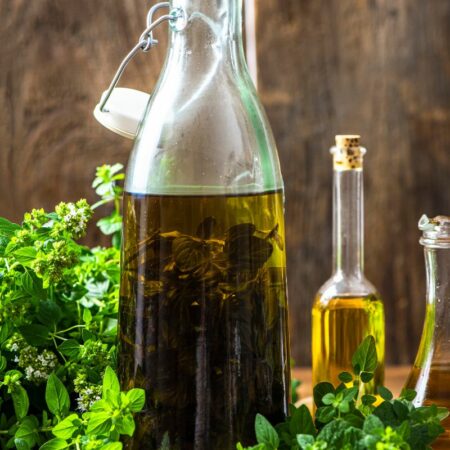
How to Make Your Own Oregano-Infused Oil
Ingredients
- 1 ounce of dried oregano preferably organic
- 8 ounces of organic olive oil or another food-grade oil
Instructions
- Combine 1 ounce of dried oregano with 8 ounces of olive oil in a blender.
- Blend for about 30 seconds to break down the oregano and mix it well with the oil.
- Fill a pot with a few inches of water and place a heat-safe bowl or smaller pot over it (make sure it doesn’t touch the water).
- Heat the water on low to create a gentle heat.
- Pour the oregano-oil mixture into the heat-safe bowl (or the top part of the double boiler setup).
- Allow the mixture to heat on low for 12 to 24 hours, making sure the water doesn’t boil—just maintain a warm temperature.
- Stir the oil occasionally during this time to help the infusion process.
- After heating, remove the oil from the double boiler and let it cool.
- Strain the oil through a fine mesh strainer or cheesecloth to remove the oregano pieces.
- You’ll be left with a fragrant oregano-infused oil.
- Pour the strained oil into a clean, dry, dark-colored bottle to protect it from light.
- Store the bottle in a cool, dark place. This oregano-infused oil will last for up to 6 months.
Notes
Why Oregano-Infused Oil is the Better Choice
To recap, oregano-infused oil is a safer, gentler, and more balanced option for internal use compared to concentrated essential oils. The infusion process extracts a wider range of beneficial compounds from the leaves of the oregano plant (Origanum vulgare) without the risk of overwhelming your system. This makes it perfect for adding to foods or taking as a supplement to support gut health, the immune system, and even provide mild antimicrobial and anti-inflammatory benefits.
While essential oils can be powerful, they are best reserved for aromatherapy or diluted topical applications due to their strength and potential risks if taken internally. By choosing oregano-infused oil, you get the benefits of the whole plant in a safer form that’s easy to use and versatile for both internal and external use.
